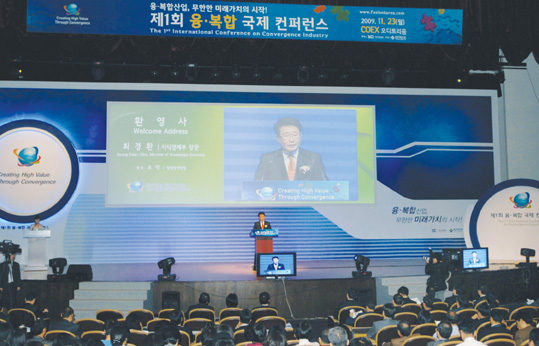Tapping Emerging Convergence Industries
The 1st International Conference on Convergence Industries attracts globally renowned scholars

The recent 1st International Conference on Convergence Industries provided an insight into the latest developments of the emerging convergence industries in Korea and around the world, industry and government officials said.
Futurist authority Daniel H. Pink, author of several global bestsellers, including ¡°A Whole New Mind,¡± John Strassner, former Motorola vice president, and other time-honored academics participated in the international conference, held at the COEX Auditorium on Nov. 23. The forum, organized by the Ministry of Knowledge Economy and the Korea Institute of Industrial Technology jointly under the catchphrase ¡°Creating High Value through Convergence, attracted keen interest from industry, research and government circles.
The conference was designed for industry and government circles to establish consensus and future strategies for the emerging convergence industries in order to help the nation get a jumpstart in the promising industries by reviewing the latest developments on convergence on the international and Korean fronts, Lee Dong-uk, director of the Growth Engine Policy Division at the MKE said.
An analysis of 22 representative emerging convergence industries, conducted by Deloitte in 2009 showed that the global emerging convergence industry market is projected to surge from $8.6 trillion in 2008 to $20 trillion in 2013 and $61 trillion in 2018. The 2013 global market outlook estimated the green car industry at $8.8 trillion, bio convergence energy industry at $2.3 trillion, bionics industry at $2.3 trillion and living culture content industry at $2.1 trillion.
MKE officials expressed the hope that the nation would take the lead in the global emerging convergence industries through spearheading standards by swiftly coping with competition rules changes caused by the spread of convergence trends.
The officials said they expect Korea to create new ¡°blue-ocean¡± and premium markets ¡ª new growth engines through creative innovation in order to overcome the growth limit in the existing ¡°red-ocean¡± technology and industrial sectors. Among the convergence examples are Nintendo Wii for a unique social gaming experience for the whole family and the iPhone, a combination of iconic design and consumer-friendly service.
The emerging convergence industries could have far-reaching industrial spillover effects by commercializing them in a short period of time through the innovation of existing fabrication ¡ª having an effect of boosting the economy. In the mobile phone materials industry, the time-to-market for translating an idea into a product is seven months by combining the existing technologies and three to four months in the case of developing original technologies.
The emerging convergence industries will encourage SME startups and employment as they are considered suitable for SMEs, which devote themselves to tapping the niche markets of convergence and producing such ¡°idea¡± items as screen golf, the electric toothbrush, steam cleaners and roller blade shoes, according to the officials. Thanks to the government¡¯s policy of promoting venture companies, an annual average of 86,000 venture companies have sprung up since after the Asian financial crisis in 1997.
Pink delivered a keynote speech on the theme ¡°Creating New Values through Convergence,¡± a speaker of Session 1: ¡°Convergence Success Stories and Future Convergence Industries through Successful Global Corporation Practices.¡±
In his lecture, Pink said the world is ushering in an era of convergence in which high-tech gives way to ¡°high-concept¡± and ¡°high-touch.¡± He stressed that a combination of two or more among technology, business model and process will have synergetic effects and become a driving force behind industrial development, so manpower with intellectual capability that can properly deal with convergence industries are prerequisite, such people as artists, inventors, storytellers and social welfare workers. He spoke about six success stories of convergence industries and the industries¡¯ impact on Korea.
Strassner gave a keynote speech about ¡°Convergence, a Central Force behind the Future of Global Economy.¡± He lectured about the unlimited potential of vision for creating convergence industries and his experiences with the convergence industry practices of Cisco, Intelliden and Motorola. He spoke about Korea¡¯s leading position in the creation of convergence industries and demonstrated via case analysis how convergence industries would have an affirmative and great impact on our life.
Lee Hyun-soon, vice chairman in charge of R&D, spoke about ¡°Globetrotting Korean Firms¡¯ Convergence Business.¡±
Speakers of Session 2: ¡°Convergence Industries in Daily Life,¡± were Woo Chang-hyun, CTO of Golf Zone and concurrently president in charge of research, Lee Soo-jin, president of Korea Aerospace Research Institute, and Karim Karti, president of GE Healthcare, each demonstrated convergence technologies closely related to daily life ¡ª screen golf, unmanned reconnaissance planes, artificial satellite footage and remote-controlled diabetes diagnosis while delivering their respective lectures.
Among the speakers of Session 3: ¡°Direction of the Development of Traditional Manufacturing Industries through Convergence,¡± were Shin Sung-soo, vice president of STX Offshore & Shipbuilding, Cho Hae-sung, president of SD Solar, and Bradley Buckwalter, CEO of OTIS Elevator Korea.
The conference coincided with the demonstration of convergence practices so that participants could get a better understanding of convergence industries. Active discussions among prestigious panelists from academia and research circles served as a good opportunity to contribute to the advancement of the convergence industries, organizers said.
Cho-suk, director-general of emerging industries at the MKE, said, ¡°Recognizing the significance of the emerging convergence industries, the government is striving to establish strategies for creating these industries so that government ministries¡¯ budgets for the emerging convergence industries can be raised from the current 1.6 trillion won and steps can be taken to lay the infrastructure and ensure institutional overhaul in order to help SMEs tap the industries in a stable and smooth fashion.¡± nw
Cho Suk, deputy minister of the Office of Industries at the Ministry of Knowledge Economy (MKE), speaks on behalf of MKE Minister Choi Kyung-hwan at the 1st International Conference on Convergence Industries.
3Fl, 292-47, Shindang 6-dong, Chung-gu, Seoul, Korea 100-456
Tel : 82-2-2235-6114 / Fax : 82-2-2235-0799